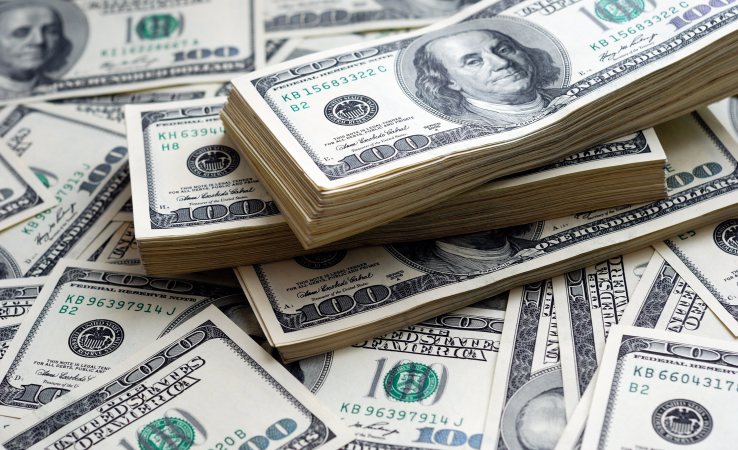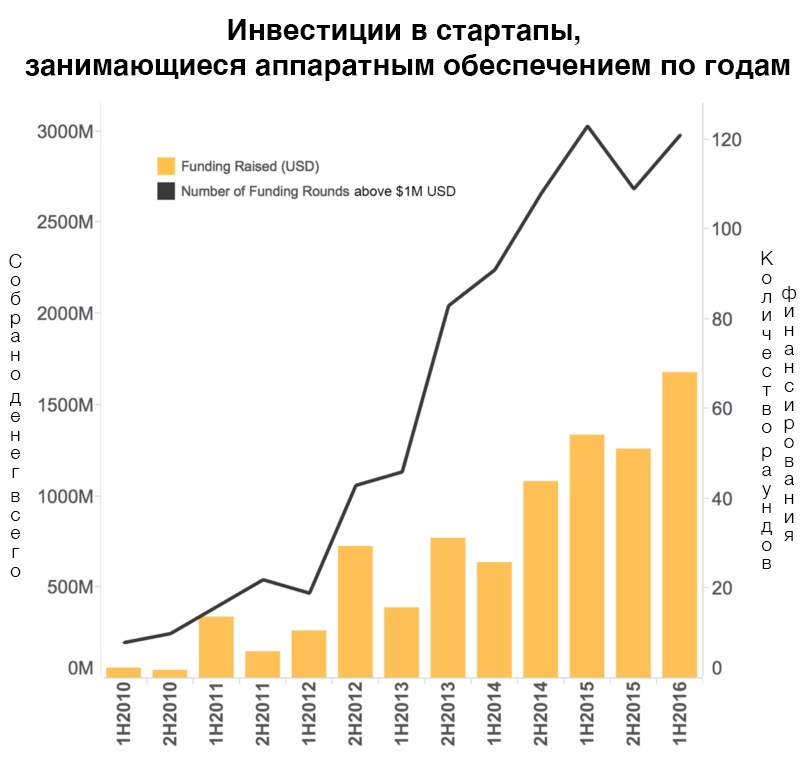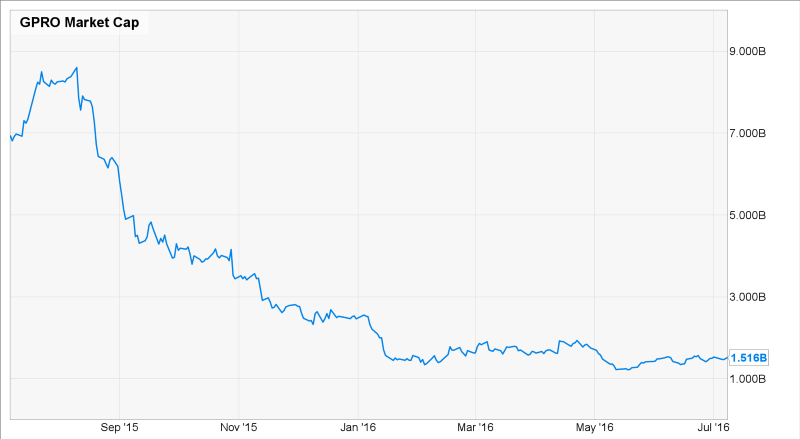Who invests in iron?

Author: Chris Kinter is a partner in Bolt , a seed fund that invests money, resources, development, and expertise in startups working at the interface between hardware and software.
The renaissance in the hardware world is just beginning. Having favored a reduction in the cost of development, a reduction in the time it takes to bring a product to the market and the transition of a business model from consumer consumer electronics to software services that generate regular income, venture funds began to invest in hardware startups.
A review of this explosion in investment was published last year. The volume of investments increased by more than 30 times compared with investments 4 years ago. What happened during this time? Does the sphere justify such a stir? That's what we found out.
Investment growth continues
In contrast to the massive decline in venture capital funds, iron companies continue to receive investments. In the first half of 2016, $ 1.7 billion was invested in 120 transactions — more than invested in any other semi-annual period in the last 10 years. But while the money is flowing, the number of transactions remains the same as in the same period last year (120 and 123, respectively). From this we can conclude that the growth jump gradually aligns with the development of the sphere, investors become smarter with initial investments and choose companies that can bring the product to the market.
')

Data as of July 1, 2016. Open rounds of funding are taken, where more than 1 million dollars were collected. Several major players like Xiaomi, Magic Leap and Jawbone are not taken into account. Source: Bolt and Crunchbase
GoPro and Fitbit troubles
Last year's GoPro and Fitbit iron lovers had difficulty maintaining their level of growth and both now hardly have a quarter of their maximum market capitalization. It is interesting that their difficulties are caused not by the fact that their competitors began to trade in analogues, but by the fact that their own market segments are oversaturated. If I already have a GoPRo or FitBit, I practically have no need to buy the latest and clever model of the same manufacturer. See if one of these companies can successfully launch a new product line in the upcoming year.

Dynamics of market capitalization GoPRo
Minor acquisitions and placement of a small number of shares
Last year, several exit deals were concluded: Square , Misfit , Withings , Whistle and JayBird . Of course, these are not so many multi-billion deals as in 2014, but still, some investments have been successfully implemented.

Source: Bolt
San Francisco still dominates hardware financing
Although the communities of Boston and New York have expanded considerably, San Francisco is almost two times ahead of Boston and New York. The number of startups borrowing iron in the Gulf (which attracted more than a million dollars in open rounds) is 161, according to my calculations, compared to 110 in last year. New York recently surpassed Boston in terms of the amount of money collected and the number of start-ups funded.
 Source: Bolt
Source: BoltThere are more funds investing in hardware
Last year, Eclipse collected the first $ 125 million, and it is reported that the company is already organizing the next fund. The Hardware Club , located in Paris, also organizes its foundation. It is too early to judge which of the venture organizations has become the most successful investor in this field. The largest realized investments (Fitbit, Square and Nest ) were initiated even before 2011, when there was a real boom in the field of hardware. That is, venture funds have already more than justified their investments ( SoftTech and True Ventures with Fitbit, Kleiner and Shasta Ventures with Nest and Khosla with Square), but the absolute majority of startups funded by venture funds exist only 2-4 years.
Over the past few years, there has been a rush of investment in the field, the next few years will be devoted to the introduction of development.
The number of investment transactions of a venture fund in a certain area does not yet indicate its focus on this particular field of activity. For example, a16z concluded 50% more investment transactions in the field of iron than lux capital . But less than 8% of the a16z portfolio falls under the hardware category, and Lux Capital has more than 25% of the transactions.
findings
Over the past year and a half, we have seen an increase in investment in hardware, but this leap is leveling as the sector develops. Many developments that caused a stir in 2013 and 2014 finally entered the market. And although it is too early to draw conclusions on most products, we have already seen several breakthrough developments ( Eero ), as well as several failures ( Skully ).
Over the past few years, there has been a flurry of investment, the next few years will be devoted to the introduction of development. With the number of new funds and accelerators, raising money in the early stages of iron development is now a simple task. But the search for means to scale the business is still almost impossible event.
By hardware everyone understands something of their own. By “hardware”, I usually mean startups that produce Internet devices and are involved in software and hardware. Startups involved in robotics, wearable devices, the Internet of Things fall under my definition. And most consumer companies are not suitable. Companies such as Casper, Warby Parker or Bonobos are more likely to be engaged not in hardware, but as digital brands introducing innovations in product distribution.
Original: Who invests in hardware?
Source: https://habr.com/ru/post/313580/
All Articles